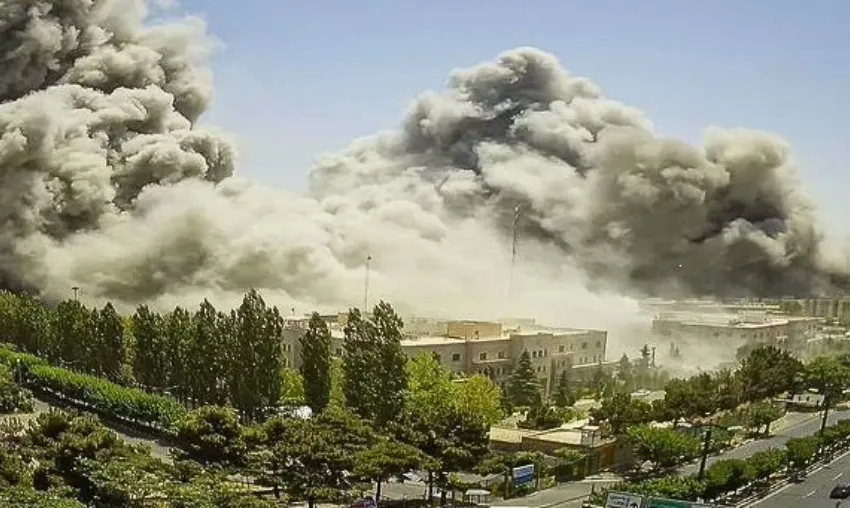Doha / Tehran / Jerusalem - It was only a matter of time before the shadows of the new war fell over additional countries. In the early hours of Monday, several explosions shook the Gulf region - of all places, Qatar, home to the strategically most important US Air Force base, Al Udeid. Shortly before, the country had closed its airspace. The reason: massive threats from Tehran to hold the United States accountable for its attack on Iran’s nuclear facilities. Eyewitnesses reported rockets in the night sky, while Iranian government officials initially remained silent. But a cryptic message on X (formerly Twitter) by President Masoud Pezeshkian shortly before the detonations left no doubt about the direction: “We did not start this war, we did not want it. But we will not leave an invasion of great Iran unanswered.” Qatar itself did not issue an official statement - but the symbolism is unmistakable: the Gulf state, diplomatically close to Washington and at the same time economically dependent on cooperation with Tehran, is caught between the fronts of a conflict that is regionalizing at breathtaking speed.
Israel strikes at the heart of the Islamic Republic. Already during the day, Israel had expanded its attacks on Iran - not only militarily, but deliberately targeting the regime's symbols. Rockets hit near the gates of the notorious Evin Prison in Tehran, a facility that houses political prisoners, dual nationals, and regime critics. The command center of the morality police - that force which brutally crushed the protests following the death of Mahsa Amini in 2022 - was also hit. Although the Israeli government insists it does “not want to topple the regime,” the goal appears clear: a moral, strategic, and psychological blow to the backbone of the Islamic Republic. And a message to the population that has long yearned for change. That the United States is now de facto part of this war is largely due to Donald Trump. With his order to deploy B-2 bombers and 30,000-pound bunker-busting bombs on three Iranian nuclear sites - Fordow, Natanz, and Isfahan - the US president has crossed a red line that his predecessors avoided for good reason. On Monday evening, Trump doubled down rhetorically. On Truth Social he asked with a smirk: “If the current Iranian regime is not able to MAKE IRAN GREAT AGAIN - why wouldn’t there be a regime change?” One sentence, one question mark - and an international tremor. The White House attempted to deescalate, with Press Secretary Karoline Leavitt calling it a “purely hypothetical consideration.” But in Tehran, the words were interpreted as a declaration of war.
General Abdolrahim Mousavi, Iran's top-ranking military officer, spoke openly of a “blank check” to strike back against American interests - anytime, anywhere. The US had violated Iran’s sovereignty, the attacks were an “act of invasion,” said the state news agency IRNA. And with more than 40,000 US soldiers stationed in the region - many within range of Iranian short-range missiles - the risk of widespread escalation is more real than ever. Israel’s military also issued a new statement: in the “coming days,” it would attack more military bases in and around Tehran - with full intent to now target symbolic sites as well. Even the access roads to the Fordow nuclear facility were destroyed to block entry. On Monday, Iran launched the third phase of its offensive with rockets and drones against Israel - targeting, among others, Tel Aviv and Haifa. Explosions were heard in Jerusalem, apparently intercepted by defense systems. The Israeli emergency service Magen David Adom reported no injuries. But the toll of the war is already devastating: at least 950 dead in Iran, over 3,400 injured, according to the human rights group HRANA; in Israel, more than 1,000 injured and 24 dead. The Abdorrahman Boroumand Center expressed alarm over the fate of inmates in Evin. After the strike, state television aired footage meant to show “orderly conditions” - but human rights activists reported power outages, fear, and isolation behind the regime prison’s walls.

In Vienna, IAEA chief Rafael Grossi spoke of possible severe damage to the nuclear facilities. Although Iran claimed to have removed uranium and materials from Fordow before the attack - the whereabouts remain unclear. A formal report to the nuclear watchdog has yet to be submitted. Russian President Putin called the attacks on Iran “an unprovoked aggression” and held talks in Moscow with Iranian Foreign Minister Abbas Araghchi on how to “deescalate the situation.” That this currently seems hardly possible is due not only to military dynamics - but also to the lack of political will in both Washington and Tehran. This conflict is no longer just a war between Israel and Iran. It is a magnet for new flashpoints - from Gaza to Qatar, from Al Udeid to Evin. A war in which threats, airstrikes, and digital declarations have long since merged. A war that no one wants - and yet no one can stop. The sentence looming over everything does not come from a diplomatic dossier, but from Donald Trump himself: “Why wouldn’t there be a Regime change???” Three question marks now echo thousands of miles away - and keep awake a world that had long hoped to forget how fragile peace can be.
